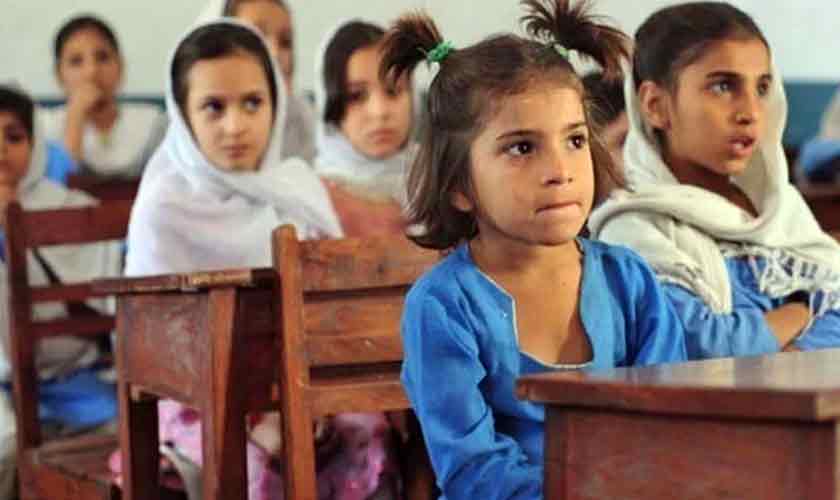Disclaimer: Website Under Maintenance: Our website is currently under maintenance. We apologize for any inconveniences.

In a move that demonstrates commendable political will, Prime Minister Shahbaz Sharif's recent Education Emergency Conference addressed a pressing issue: Pakistan's dismal education indicators. With 26 million out-of-school children - the highest number in the world - the situation demands urgent and effective action. The government's pledge to allocate $25 million over the next five years to boost enrollment rates and its initiative to link the Benazir Income Support Programme with education stipends are steps in the right direction. These steps deserve both praise and the full support of every Pakistani citizen.
That said, these measures, while praiseworthy, do not fully address the deep-rooted challenges of our education system.
The prime minister's recent announcement of Pakistan's education emergency is an important step. There is an argument for the signing of a cross-party Charter of Education. Such a charter should include all political parties to promote collective action and ensure the sustainability of policies. It will require a commitment to prioritise education as a national issue and invest the necessary resources to ensure that every child has access to quality education.
A glaring gap in the current approach is its top-down nature. It involves federal and provincial governments but excludes district and school-level actors. Effective educational reform requires the insights and involvement of those who are closest to the ground realities: local educators, administrators and community leaders. Their absence from both the discourse and the planning process means that critical, on-the-ground perspectives are not informing policy decisions. A decentralised approach that empowers local stakeholders could lead to more nuanced and practical solutions tailored to specific community needs.
Among the 26 million, most of the children are either unable to attend school at their right age or dropouts and are now over age to learn through a classroom environment. Poverty, limited access, dismal quality, the efficacy of education, malnutrition, early marriages and child labour are just some of the challenges for such children that need extraordinary inclusive planning and implementation mechanisms by engaging all stakeholders at all levels.
The unique challenges faced by marginalised groups, such as children with disabilities; minorities; and transgender children demand special attention. These children encounter barriers that are often overlooked in broad policy measures. Accessible infrastructure, specialised training for teachers and inclusive curricula are essential to ensuring these children receive a quality education. Without targeted strategies to address their needs, we risk perpetuating their exclusion from the education system.
The Education Emergency Conference marks a positive start. It must be the beginning of a broader, more inclusive and well-funded effort to overhaul Pakistan's education system.
Another crucial aspect is the curriculum. Introducing a skills-based curriculum that equips students with life skills, cognitive capabilities and income-generating skills can make education more relevant. The dual focus on functional literacy and vocational training can help break the cycle of poverty by providing immediate economic benefits, thus incentivising school attendance and retention.
Financial investment in education is a cornerstone of any meaningful reform. The government's vague commitment to making the 'best effort' to increase public investment to four per cent of the GDP lacks the specificity needed to drive real change. Governments have been making similar pledges for 75 years. Given the magnitude of the crisis, a concrete, actionable financial plan is imperative. For instance, the government could commit to raise the education budget by a certain percentage each year, ensuring that it reaches four per cent of the GDP by 2029. This would provide a clear, measurable path forward and signal a serious commitment to education.
With milestones set at just two months, there is a risk of raising unrealistic expectations that could lead to disillusionment and policy fatigue. A sustainable timeline, with clearly defined short-, medium-, and long-term goals, allows for incremental progress that builds momentum and maintains public and political support.
Government action alone will not be enough to solve Pakistan's education emergency. Civil society, the private sector and the international community all have roles to play in supporting education initiatives and advocating for change. NGOs and community-based organisations can play a crucial role in providing education services to underserved communities and mobilising support for education reform.
Likewise, businesses can contribute to education financing through corporate social responsibility initiatives and partnerships with schools and educational institutions.
Accordingly, while the Education Emergency Conference marks a positive start, it must be the beginning of a broader, more inclusive and well-funded effort to overhaul Pakistan's education system. Only by involving all stakeholders, addressing the needs of marginalised groups, integrating skills-based learning and committing to concrete financial investments and realistic timelines can we hope to turn the tide on our education crisis. The future of millions of Pakistani children depends on it.
The writer is the national coordinator for Pakistan Coalition for Education and a Malala Fund education champion. She can be contacted at [email protected] & on Twitter @zehra2576
Source: https://www.thenews.com.pk/tns/detail/1193145-bridging-the-gap